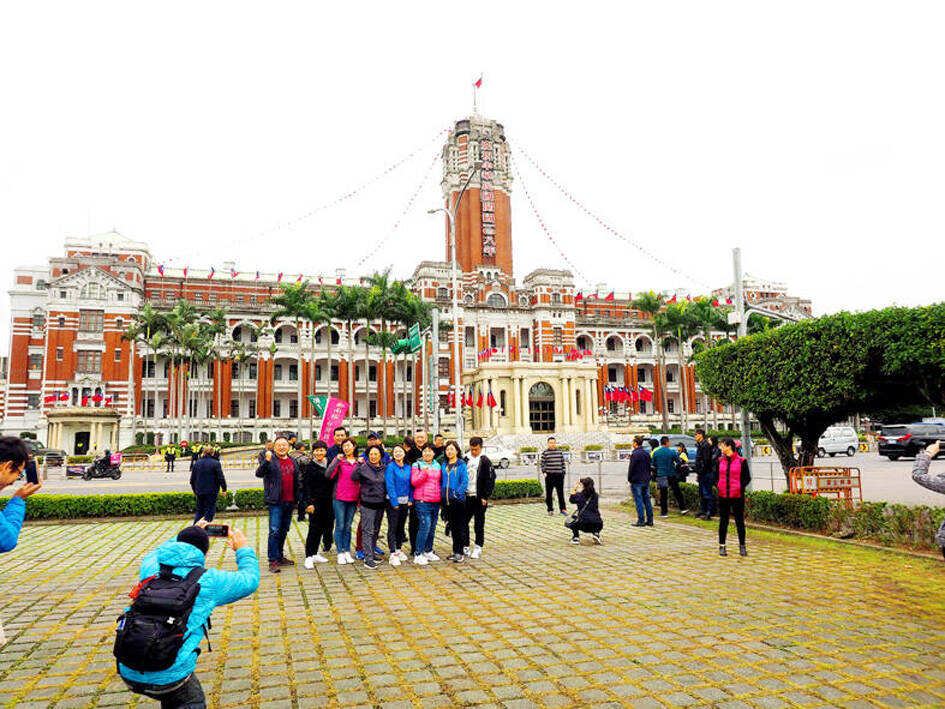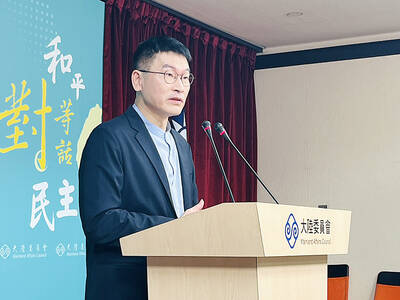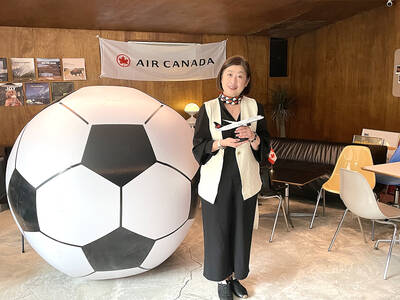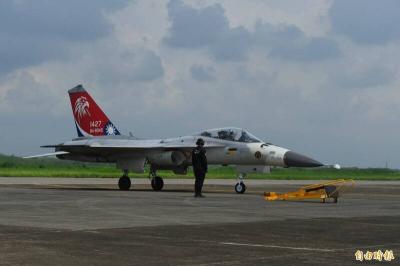Beijing’s new cross-strait tourism policy of allowing residents in Shanghai and its Fujian Province to visit Taiwan would not help the Tourism Administration reach its goal of attracting 10 million international tourists this year, cross-strait experts said.
China unilaterally announced the policy on Jan. 17 after President William Lai (賴清德) in his New Year’s address said that cross-strait tourism could resume through negotiations between Taiwan’s semi-official Taiwan Strait Tourism Association (TSTA) and China’s Association for Tourism Exchange Across the Taiwan Straits (ATETS).
The Mainland Affairs Council late last month said that TSTA would soon contact the ATETS to discuss issues that might arise in the implementation of the policy, such as verifying the lists of Chinese travel agencies organizing tours to Taiwan and Taiwanese travel agencies hosting Chinese tourists.

Photo: David Chang, EPA-EFE
Tourism Administration director-general Chou Yung-hui (周永暉) told the Taipei Times that the purpose would be to “discuss how to maintain the safety and quality of tours when Chinese tourists travel in Taiwan, particularly related to problems caused by low-priced shopping tours.”
Negotiations could begin after the Lunar New Year holiday, he added.
Beijing’s decision to partially resume cross-strait tourism after suspending it for six years is an interim response to the changes in its relations with the US and Taiwan, said Chang Wu-ueh (張五岳), professor of diplomacy and international relations at Tamkang University.
That Beijing lifted the travel ban to Taiwan for residents in Shanghai and its Fujan Province three days before the inauguration of US President Donald Trump, who has made countering China’s global influence one of his major political agenda, is to show Washington that it is willing to communicate with Taiwan and adopt a milder approach in addressing cross-strait issues.
Beijing did not react much to Lai’s New Year’s address because it neither provoked hostility nor hinted at a drastic change to his approach to cross-strait relations, Chang said.
At the Taipei-Shanghai Twin City Forum in December last year, Shanghai Deputy Mayor Hua Yuan (華源) said that Taiwanese should visit Shanghai more often and pledged to promote group tours to the city’s residents.
Hua would not have had the confidence of making such a remark if he did not have authorization from Beijing, he said.
Former president Ma Ying-jeou (馬英九) and Chinese President Xi Jinping (習近平) pledged to boost cross-strait tourism during their meeting in April last year. That was the only item on their agenda that can be realistically implemented, and such a policy must be realized ahead of another expected Ma-Xi meeting this year, which would be held to celebrate the 10th anniversary of their first meeting in 2015, he said.
While most Chinese tourists would likely prefer to travel to Taiwan independently, Beijing at this point would probably only allow group tours, as it can control the number of tourists and their itineraries, Chang said.
However, early results of the policy shift could determine whether residents from other Chinese cities or provinces would be allowed to visit Taiwan, he said.
“Aside from the new cross-strait tourism policy, Beijing also called for Taiwan to drop its group tour ban and downgrade its travel alert for China,” he said.
If both sides are committed to resolving these issues in meetings of the two associations, it would facilitate visits of Chinese tourists from other places in China,” he said, adding that it is not an insurmountable obstacle.
However, people should not expect cross-strait tourism to return to the levels they were at before 2015, when Taiwan received about 4 million annual Chinese tourists, Chang said.
Beijing could always escalate its pressure on Taiwan if Washington dispatches national security officials of higher ranks to Taiwan, or Taiwanese officials meet with US national security officials, he said.
The types of weapons that Washington sells to Taipei, as well as how Lai is hosted when transiting in the US to visit allies in Central and South America, could become factors that produce a policy shift in Beijing, he added.
As of November last year, about 377,499 Chinese tourists visited Taiwan via a third country, while 2.54 million Taiwanese visited China.
Allowing Chinese residing in Shanghai and its Fujian Province to visit Taiwan would probably add about 400,000 international tourists to Taiwan, said Huang Cheng-tsung (黃正聰), associate professor at Providence University’s Department of Tourism.
International tourists from other countries would have to increase for the Tourism Administration to meet its goal of having 10 million international visitors this year, he said.
Unlike during Ma’s administration, when Chinese tourists were a driving force of the global travel market, Chinese are now encouraged to travel domestically, and their spending power has also significantly declined over the past few years due to weaker economic growth, he added.
Taiwan is unlikely to immediately lift the group tour ban and downgrade the travel alert to China following Beijing’s announcement, he said.
Chinese travel agents would have to first travel to Taiwan to scout for potential tour arrangements, and the government would also have to wait and see if China has implemented the policy shift to allow group tours to visit Taiwan, he said.
The travel alert is issued because the government has the responsibility to inform the public about the risks of traveling to China following its promulgation of the 22-point set of “guidelines” to penalize so-called “die-hard” Taiwanese independence separatists, Huang said.
“It is better that we wait about three months after China implements the policy before considering lifting the group tour ban and lowering the travel alert,” he said.
High Quality of Travel Association chairman Ringo Lee (李奇嶽) said resuming negotiations over tourism issues through the two associations would be a welcoming development, as the mechanism had helped to create a safe and regulated cross-strait tourism market.
“Not only would the mechanism help boost the tourism operators’ confidence in the market, but it would prevent cross-strait tourism from being affected by political factors. It is the best way forward when both cannot communicate on the basis of the so-called ‘1992 consensus.’”
However, Lee said that tourism operators should be aware about the need to bolster their ability to manage the potential risks from entering the cross-strait tourism market as it could easily be disrupted by political changes.
Beijing in August 2019 suspended individual travel for residents of 47 Chinese cities. It banned overseas group tourism in 2020 due to the COVID-19 pandemic.
Taipei toward the end of 2023 announced that groups tours to China would be allowed beginning in March last year. However, in February last year, it announced that the policy would be suspended beginning in June due to a lack of a reciprocal response from Beijing and its unilateral changes to the M503 flight route, which Taipei said would threaten flight safety.
Beijing in August last year announced that it has lifted restrictions on group and independent travel to Lienchiang County from China’s Fujian Province. The following month it announced that they would be allowed to travel to Kinmen County as well.
The “1992 consensus” refers to a tacit understanding between the Chinese Nationalist Party (KMT) and the Chinese Communist Party that both sides of the Strait acknowledge there is “one China,” with each side having its own interpretation of what “China” means.

LOW RISK: Most nations do not extradite people accused of political crimes, and the UN says extradition can only happen if the act is a crime in both countries, an official said China yesterday issued wanted notices for two Taiwanese influencers, accusing them of committing “separatist acts” by criticizing Beijing, amid broadening concerns over China’s state-directed transnational repression. The Quanzhou Public Security Bureau in a notice posted online said police are offering a reward of up to 25,000 yuan (US$3,523) for information that could contribute to the investigation or apprehension of pro-Taiwanese independence YouTuber Wen Tzu-yu (溫子渝),who is known as Pa Chiung (八炯) online, and rapper Chen Po-yuan (陳柏源). Wen and Chen are suspected of spreading content that supported secession from China, slandered Chinese policies that benefit Taiwanese and discrimination against Chinese spouses of

PROMOTION: Travelers who want a free stopover must book their flights with designated travel agents, such as Lion Travel, Holiday Tours, Cola Tour and Life Tours Air Canada yesterday said it is offering Taiwanese travelers who are headed to North America free stopovers if they transit though airports in Japan and South Korea. The promotion was launched in response to a potential rise in demand for flights to North America in June and July next year, when the US, Canada and Mexico are scheduled to jointly host the FIFA World Cup, Air Canada said. Air Canada offers services to 13 of the 16 host cities of the tournament’s soccer games, including Toronto and Vancouver; Mexico City, Guadalajara and Monterrey in Mexico; Atlanta, Georgia; Boston; Dallas; Houston;

The US approved the possible sale to Taiwan of fighter jet spare and repair parts for US$330 million, the Pentagon said late yesterday, marking the first such potential transaction since US President Donald Trump took office in January. "The proposed sale will improve the recipient's capability to meet current and future threats by maintaining the operational readiness of the recipient's fleet of F-16, C-130," and other aircraft, the Pentagon said in a statement. Trump previously said that Chinese President Xi Jinping (習近平) has told him he would not invade Taiwan while the Republican leader is in office. The announcement of the possible arms

ALIGNED THINKING: Taiwan and Japan have a mutual interest in trade, culture and engineering, and can work together for stability, Cho Jung-tai said Taiwan and Japan are two like-minded countries willing to work together to form a “safety barrier” in the Indo-Pacific region, Premier Cho Jung-tai (卓榮泰) yesterday said at the opening ceremony of the 35th Taiwan-Japan Modern Engineering and Technology Symposium in Taipei. Taiwan and Japan are close geographically and closer emotionally, he added. Citing the overflowing of a barrier lake in the Mataian River (馬太鞍溪) in September, Cho said the submersible water level sensors given by Japan during the disaster helped Taiwan monitor the lake’s water levels more accurately. Japan also provided a lot of vaccines early in the outbreak of the COVID-19 pandemic,